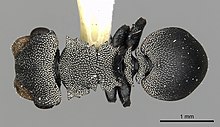Cephalotes manni
Appearance
| Cephalotes manni | |
|---|---|

| |
| Cephalotes manni | |
| Scientific classification | |
| Domain: | Eukaryota |
| Kingdom: | Animalia |
| Phylum: | Arthropoda |
| Class: | Insecta |
| Order: | Hymenoptera |
| Family: | Formicidae |
| Subfamily: | Myrmicinae |
| Genus: | Cephalotes |
| Species: | C. manni
|
| Binomial name | |
| Cephalotes manni (Kempf, 1951)
| |
Cephalotes manni is a species of arboreal ant of the genus Cephalotes, characterized by an odd shaped head and the ability to "parachute" by steering their fall if they drop off of the tree they're on. Giving their name also as gliding ants.[1][2] The species is native of Nicaragua and a large part of the north of South America.[3] Their larger and flatter legs, a trait common with other members of the genus Cephalotes, gives them their gliding abilities.[4]
The species was first given a description and a classification in 1951 by Brazilian entomologist Walter Wolfgang Kempf.
References
- ^ Latreille, P.A. (1802). Histoire naturelle, generale et particuliere des crustaces et des insectes. Vol. 3. F. Dufart, Paris. 467 pp. PDF
- ^ Yanoviak, S. P.; Munk, Y.; Dudley, R. (2011). "Evolution and Ecology of Directed Aerial Descent in Arboreal Ants". Integrative and Comparative Biology. 51 (6): 944–956. doi:10.1093/icb/icr006. PMID 21562023.
- ^ "Species Range Maps". Antmaps.org. Retrieved 26 January 2019.
- ^ De Andrade, Maria; Urbani, Cesare (1999). Diversity and adaptation in the ant genus Cephalotes, past and present (Hymenoptera, Formicidae). Stuttgarter Beitraege zur Naturkunde Serie B (Geologie und Palaeontologie). pp. 240–244. Retrieved 26 January 2019.
